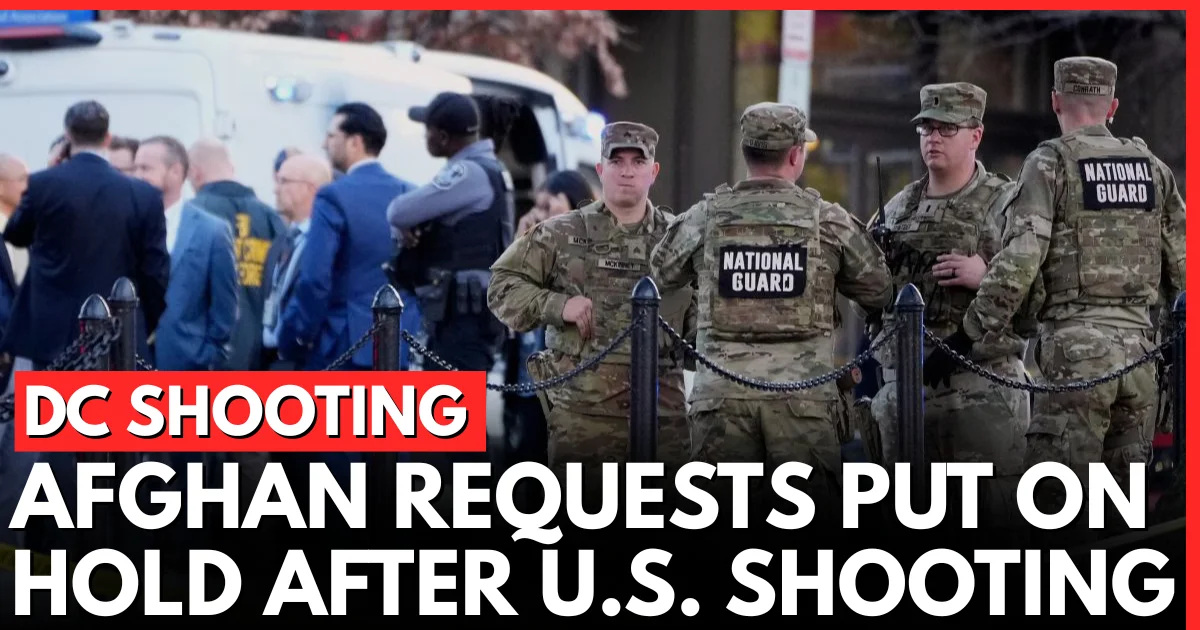The US halts Afghan immigration processing following a deadly National Guard shooting. Learn what this means for thousands of pending cases. Full details inside.
Table of Contents
US Suspends Afghan Immigration Requests Following Deadly National Guard Shooting Incident
A fatal shooting involving a National Guard member has triggered immediate policy consequences. The United States government announced suspension of immigration processing for Afghan nationals, affecting thousands of pending cases and raising difficult questions about security, fairness, and America’s obligations to wartime allies.
What Happened to Prompt This Decision
A deadly shooting incident involving the National Guard set these events in motion. The tragedy resulted in loss of life and sparked immediate government response.
Authorities have connected the shooting to an individual who entered the United States through Afghan immigration pathways. This connection prompted rapid policy reassessment.
Details about the specific incident remain subject to ongoing investigation. Law enforcement continues gathering information while families grieve their losses.
The shooting’s impact extends far beyond immediate victims. Policy consequences now affect thousands of Afghans with no connection to the violence.
The Immigration Suspension Explained
Following the shooting, US authorities announced suspension of Afghan immigration request processing. This decision affects multiple visa categories and programs.
Programs impacted include:
| Program | Status |
|---|---|
| Special Immigrant Visas (SIV) | Processing suspended |
| Afghan refugee applications | Under review |
| Family reunification cases | Delayed indefinitely |
| Humanitarian parole requests | Processing halted |
The suspension applies to new applications and pending cases alike. Thousands of Afghans already in the processing pipeline face uncertain futures.
Officials described the suspension as temporary pending security review. However, no specific timeline for resumption has been announced.
Who Is Affected by This Decision
The suspension’s impact reaches broadly across Afghan communities both overseas and within the United States.
Affected populations include:
- SIV applicants — Afghans who aided US military operations awaiting promised visas
- Refugee applicants — Individuals fleeing Taliban rule seeking safety
- Family members — Relatives of Afghan-Americans awaiting reunification
- Humanitarian cases — Vulnerable individuals needing urgent protection
- Pipeline cases — Those already approved but not yet traveled
Many affected individuals risked their lives supporting American missions in Afghanistan. Translators, security personnel, and contractors served alongside US forces for years.
The promise of immigration pathways motivated their dangerous service. Suspension leaves them in potentially life-threatening limbo.
Government Justification for the Suspension
Administration officials defended the suspension as necessary for national security. They emphasized protecting Americans while reviewing vetting procedures.
Official reasoning includes:
- Need to reassess screening processes
- Ensuring existing vetting catches potential threats
- Preventing future tragedies through enhanced review
- Temporary pause rather than permanent closure
- Commitment to eventually resuming processing
Officials stressed that the suspension reflects caution rather than permanent policy change. They acknowledged obligations to Afghan allies who served American interests.
However, critics argue the response unfairly punishes thousands for one individual’s actions. The debate over proportionality continues intensifying.
Criticism Mounts Against the Decision
The suspension has drawn sharp criticism from multiple directions. Veteran groups, refugee advocates, and some lawmakers have voiced strong objections.
Critics argue:
| Concern | Argument |
|---|---|
| Collective punishment | Thousands punished for one person’s actions |
| Broken promises | America abandoning those who served alongside troops |
| Security theater | Suspension won’t actually improve safety |
| Moral obligation | US bears responsibility for Afghan allies |
| Existing vetting | Current processes already extremely rigorous |
Veterans who served with Afghan interpreters have been particularly vocal. Many describe feeling betrayed on behalf of allies they promised protection.
Refugee advocacy organizations warn that delays cost lives. Afghans awaiting processing face ongoing danger from Taliban reprisals.
The Afghan SIV Program Background
Understanding the Special Immigrant Visa program provides important context. This pathway was specifically created for Afghans who aided American efforts.
SIV program history:
- Created to protect Afghans who assisted US operations
- Promised immigration pathways in exchange for dangerous service
- Backlogs accumulated over years of slow processing
- Afghanistan withdrawal created urgent new demand
- Processing challenges preceded current suspension
Applicants already faced years-long waits before this suspension. Many describe living in hiding while Taliban forces hunt those who helped Americans.
The program represented America’s promise to those who risked everything supporting US missions. Suspension raises questions about that commitment’s durability.
Security Versus Humanitarian Concerns
This situation crystallizes tensions between security priorities and humanitarian obligations. Both concerns carry legitimate weight.
Security perspective emphasizes:
- Protecting American lives must come first
- Vetting processes require constant evaluation
- One failure justifies systemic review
- Temporary pauses allow necessary improvements
- Better safe than sorry approach
Humanitarian perspective emphasizes:
- Collective punishment violates basic fairness
- Allies deserve promised protection
- Existing vetting already extremely thorough
- Delays endanger vulnerable populations
- American credibility depends on keeping promises
Finding balance between these perspectives challenges policymakers. Easy answers don’t exist when both safety and moral obligations matter.
What Happens to Pending Cases
Thousands of Afghan immigration cases now sit in uncertain limbo. Applicants and their families face anxious waiting without clear timelines.
Current case status:
- Applications already submitted remain in queue
- No new applications being accepted
- Approved cases not yet traveled are frozen
- Interview appointments cancelled indefinitely
- No refunds for application fees paid
Immigration attorneys report clients experiencing extreme distress. Years of waiting and thousands of dollars invested now face indefinite suspension.
Some applicants remain in Afghanistan facing active Taliban threats. Others wait in third countries with limited resources and expired temporary permissions.
Impact on Afghan-American Communities
Afghan-Americans across the United States feel the suspension’s effects deeply. Many have family members caught in processing limbo.
Community impacts include:
- Families separated indefinitely without reunion timeline
- Anxiety about relatives facing danger abroad
- Frustration with perceived collective punishment
- Fear about broader anti-Afghan sentiment
- Uncertainty about community’s future status
Afghan-American advocacy groups have mobilized quickly. They’re pressuring lawmakers and administration officials to reconsider or narrow the suspension.
Community leaders emphasize that Afghan-Americans contribute positively to American society. They reject any association with isolated violent incidents.
Congressional Response Develops
Lawmakers from both parties have begun responding to the suspension. Perspectives vary based on priorities and political positioning.
Congressional reactions include:
- Some Republicans supporting security-first approach
- Some Democrats criticizing suspension as overbroad
- Bipartisan veterans caucus expressing concern for allies
- Calls for hearings examining the decision
- Proposed legislation addressing SIV program issues
Congressional pressure could influence how long the suspension lasts. Oversight hearings may examine both the shooting and policy response.
The issue doesn’t divide cleanly along partisan lines. Veterans’ perspectives cross political boundaries and complicate simple categorization.
Looking Ahead
The path forward remains unclear as multiple pressures compete for influence. Several possible outcomes exist.
Potential scenarios:
- Suspension lifted after brief security review
- Enhanced vetting procedures implemented before resumption
- Prolonged suspension lasting months or longer
- Legal challenges to suspension policies
- Congressional intervention forcing policy changes
Affected Afghans and their advocates continue pressing for rapid resolution. Each day of delay increases danger for those awaiting protection.
The ultimate outcome will reveal how America balances competing values when they conflict directly.
FAQs
Why did the US suspend Afghan immigration requests?
The US suspended Afghan immigration processing following a fatal National Guard shooting connected to an individual who entered through Afghan immigration pathways. Officials cited the need to review security vetting procedures before resuming processing of applications.
Who is affected by the Afghan immigration suspension?
The suspension affects Special Immigrant Visa applicants, Afghan refugees, family reunification cases, and humanitarian parole requests. Thousands of Afghans who aided US military operations and their family members face indefinite delays in processing.
How long will the Afghan immigration suspension last?
No specific timeline has been announced for ending the suspension. Officials described it as temporary pending security review, but affected applicants and their attorneys have received no concrete information about when processing might resume.
What is the Special Immigrant Visa program for Afghans?
The Special Immigrant Visa program provides immigration pathways for Afghans who worked alongside US military forces as translators, interpreters, security personnel, and contractors. The program was created to protect those who risked their lives supporting American operations in Afghanistan.
Can pending Afghan immigration cases still be processed?
Currently, pending cases are frozen along with new applications. Approved cases that haven’t yet traveled are also suspended. Applicants must wait for the suspension to lift before their cases can proceed through remaining processing steps.
Conclusion
The suspension of Afghan immigration requests following the National Guard shooting presents America with difficult questions. Security concerns and moral obligations to wartime allies now stand in direct tension.
Thousands of Afghans who risked their lives supporting American missions face uncertain futures. Meanwhile, officials argue caution is necessary to protect American lives.
How this situation resolves will speak volumes about American values and the durability of promises made to those who served alongside US forces.
Stay connected for continuing updates on this developing immigration policy story. Share your thoughts in the comments below.

